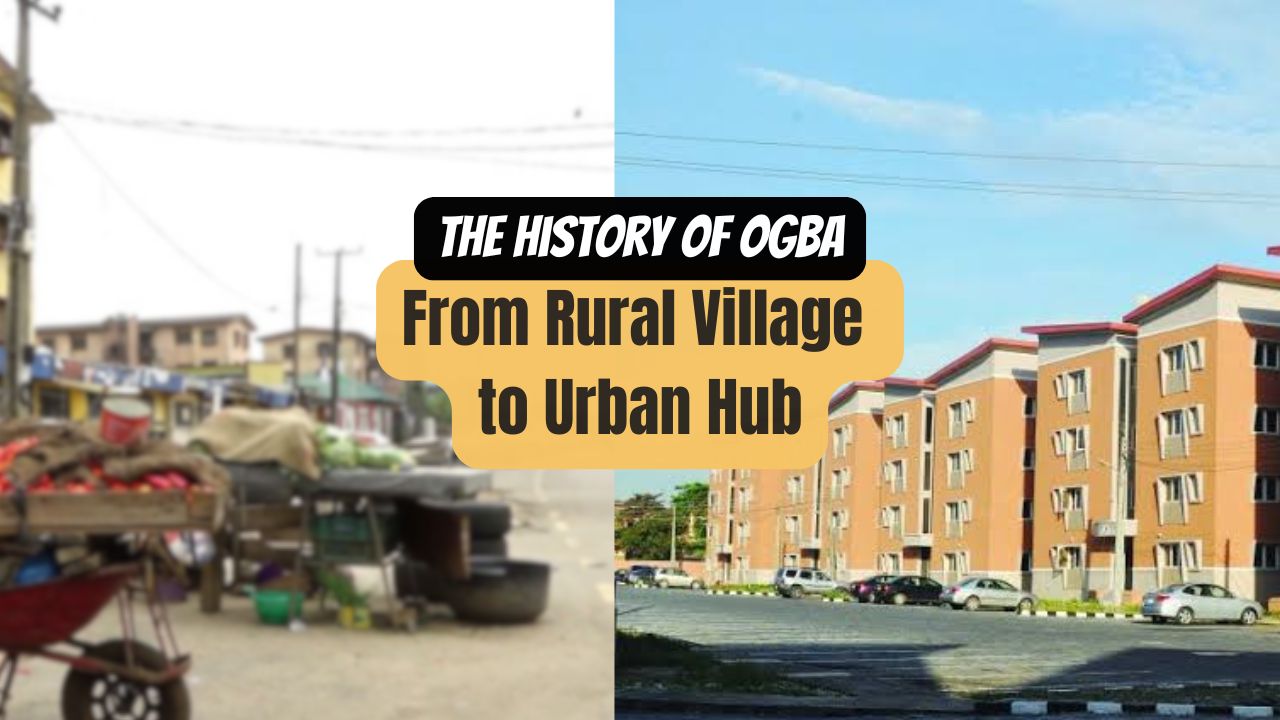The history of Ogba is a fascinating journey from a serene farming village to one of Lagos’s most vibrant urban centres.
Once surrounded by lush farmlands, Ogba’s evolution reflects the dynamic growth and transformation of Lagos over the decades.
Table of Contents
This article explores Ogba’s rich history, journey through time, and how it has become a key part of the city’s identity.

The History of Ogba
Ogba’s roots trace back to its early days as a rural settlement, where life revolved around agriculture and small-scale trade. The area’s fertile land made it ideal for farming, with crops like yam, cassava, and maize forming the backbone of its economy.
Back then, Ogba was characterized by close-knit communities. Families lived in modest compounds, and daily activities reflected a deep connection to the land and cultural traditions. Local markets were vibrant hubs where people gathered to trade goods, share stories, and strengthen social ties.
Notable historical figures from the region, including community leaders and early traders, played key roles in shaping Ogba’s development. Oral histories passed down from generation to generation provide a glimpse into the resilience and resourcefulness of its early settlers.
Ogba’s Transformation Through the Years
As Lagos began to expand, Ogba experienced significant changes that would alter its landscape forever.
Infrastructure Development
The construction of roads, schools, and markets marked the early stages of Ogba’s urbanization. Improved accessibility attracted migrants from neighbouring areas who sought better opportunities.
Migration Patterns
By the mid-20th century, Ogba became a magnet for people seeking affordable housing and proximity to industrial hubs. This migration fueled a diverse population and set the stage for rapid growth.
Industrial Growth
The establishment of industries and businesses in and around Ogba further accelerated its transformation. Factories, warehouses, and commercial establishments provided employment opportunities, drawing even more people to the area.
These developments gradually replaced the rural charm of Ogba with a more urbanized environment, yet traces of its heritage remained visible in the community’s spirit.
Amidst these changes, Ogba’s identity evolved to balance its traditional roots with its growing urban appeal.
For modern visitors or business travellers, serviced apartments like Blink & Smile provide the ideal mix of local charm and contemporary convenience.

Ogba Today, A Bustling Urban Hub
Today, Ogba stands as a vibrant urban centre teeming with activity. Modern housing estates, bustling markets, and thriving businesses dominate the landscape. The area boasts excellent transport links, including the nearby Agege Motor Road and Ikeja industrial areas, making it a strategic location for residents and businesses alike.
Cultural Blend
Despite its urbanization, Ogba retains elements of its rural past. Traditional markets like the Ogba Retail Market coexist with modern shopping centres. Community festivals and cultural events reflect the area’s enduring connection to its roots.
Economic Contribution
Ogba’s role in Lagos’s economy is significant. The area hosts various industries, small businesses, and service providers that contribute to the city’s economic vitality. From local artisans to tech startups, Ogba’s entrepreneurial spirit is palpable.
Challenges of Urbanization in Ogba
Like many urbanized areas, Ogba faces challenges that come with rapid development.
Overcrowding
The population boom has led to congestion in residential and commercial spaces. Housing demand often outstrips supply, resulting in higher rents and pressure on existing infrastructure.
Infrastructure Strain
Roads and public utilities frequently struggle to keep up with the area’s growing needs. Traffic congestion and inadequate drainage systems are common complaints from residents.
Preservation of Heritage
Balancing urban development with the preservation of Ogba’s historical and cultural identity is an ongoing challenge. Efforts to modernize often clash with the need to honour the community’s roots.
This is where thoughtful development comes into play. Blink & Smile not only offers a place to stay but embodies a commitment to maintaining the balance between comfort and cultural connection, giving guests a home-away-from-home experience that aligns with Ogba’s unique spirit.
The Future of Ogba
Ogba’s future is bright, with plans for urban renewal and infrastructure upgrades aimed at addressing its challenges. Proposed projects include road expansions, improved drainage systems, and community-focused developments that prioritize sustainability.
Vision for Sustainability
As Lagos embraces eco-friendly initiatives, Ogba has the potential to lead by example. Green spaces, energy-efficient buildings, and waste management programs could transform the area into a model for sustainable urban living.
Community Involvement
Residents and local leaders play a crucial role in shaping Ogba’s future. By participating in development projects and advocating for balanced growth, they can ensure that Ogba remains a vibrant, livable community for generations to come.
For travellers, being part of this transformative journey is as simple as choosing accommodations that honour the area’s heritage while delivering premium experiences. Blink & Smile Serviced Apartments is proud to be part of this vision, offering a seamless blend of luxury, comfort, and cultural immersion.
Conclusion
Ogba’s transformation from a rural village to an urban hub is a testament to its resilience and adaptability. Its history is deeply intertwined with Lagos’s journey, making it a unique place worth exploring.
Whether you’re in Lagos for business, leisure, or a taste of its rich history, Blink & Smile Serviced Apartments provides a premium way to stay connected to the heart of Ogba. Modern conveniences meet timeless traditions in a space designed to make your Lagos experience unforgettable.





